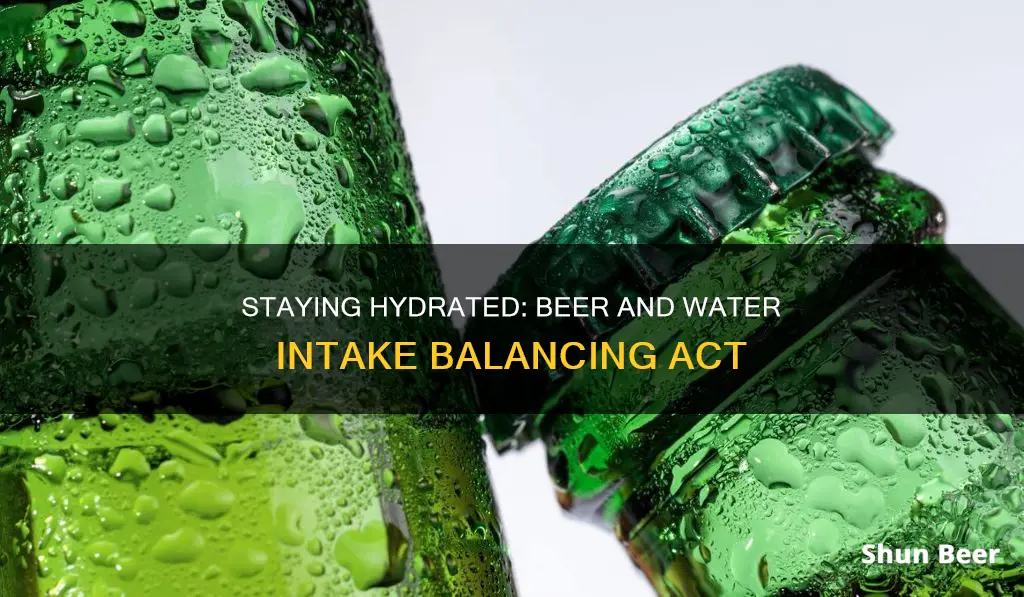
Beer is made up of 90-95% water, but that doesn't mean it counts towards your daily hydration goals. Alcohol is a diuretic, which means it makes you lose water more quickly, so it's important to drink water alongside beer to stay hydrated. The general rule of thumb is to drink one glass of water for every alcoholic drink, but the amount of water you need to drink depends on a variety of factors, including body weight, the number of drinks consumed, and personal tolerance to diuretic effects.
| Characteristics | Values |
|---|---|
| Percentage of beer that is water | 90-95% |
| Amount of water in a 12 oz beer | 10.8-11.4 oz |
| Alcohol's effect on the body | Diuretic, causing dehydration |
| Water's role in the body | Essential for hydration and flushing out toxins |
| Recommendation for drinking water with beer | Drink a glass of water between alcoholic drinks |
What You'll Learn

Beer is 90-95% water
Beer is mostly water—it comprises 90-95% of the beverage. While hops and yeast are often the stars of the show, it is water that is the primary ingredient and the backbone of your favourite brew.
The mineral content of the water used in the brewing process can significantly alter the taste of beer. This is why breweries meticulously adjust water chemistry to craft specific beer styles. For example, beers from Dublin, Ireland, are rich in bicarbonates, which are ideal for producing stouts like Guinness. The bicarbonates help manage the roastiness of dark grains, smooth out potential acidity, and enhance the stout's rich, creamy profile.
Despite water being the most abundant ingredient in beer, it is often overlooked by casual drinkers. However, it is this very ingredient that defines the structure of the beverage and can make or break a brewery's signature style. The quality of the final product is crafted from the source up, starting with water.
While beer does contain a significant amount of water, it also contains alcohol, which is a diuretic. This means that consuming beer can lead to dehydration if not balanced with drinking water. Therefore, it is not advisable to consider beer or other alcoholic beverages as a substitute for water in terms of hydration.
Drinking Beer on London Streets: What's the Law?
You may want to see also

Alcohol is a diuretic
Vasopressin is an anti-diuretic hormone that tells your kidneys to reabsorb water if it's needed by your body, rather than flush it out through the bladder. But the way alcohol interferes with this natural signal, switching it off, means the bladder is free to fill up with urine, resulting in the need to pee more often.
The consequence is that we lose more liquid through our pee than we take in. That's why we need to go to the toilet more often when we drink alcohol and also why we're at danger of becoming dehydrated unless we replace the excess lost fluid by drinking more water.
Dehydration is more likely in hot weather even without drinking alcohol, so it's especially important to replace lost fluids with water when drinking in hot weather. Heatwaves can be dangerous in their own right – and adding alcohol to the mix increases your risk of dehydration, heat exhaustion or heat stroke.
Dehydration can become serious and lead to confusion and seizures. Serious dehydration requires urgent medical attention. The effects of dehydration include feeling thirsty, dizzy, lightheaded and tired, experiencing a dry mouth and lips and dark yellow and strong-smelling pee.
Dehydration makes hangover symptoms worse too. It’s important to replace lost fluid by drinking extra water if you choose to drink alcohol.
Beer and Health: Everyday Drinking Explored
You may want to see also

Drink water to reduce negative effects of alcohol
Drinking water is an effective way to reduce the negative effects of alcohol. Alcohol is a diuretic, which means it causes you to lose more water through urination. This dehydration is a major contributor to hangovers, causing headaches, sluggishness, thirst, and irritability.
To minimize these negative effects, it is important to drink water alongside alcoholic beverages. Anthony Giglio, a wine expert, recommends drinking a glass of water (8 ounces) for each alcoholic drink to ensure proper pacing and prevent overindulgence. This strategy can help replace lost fluids, combat dehydration, and slow the absorption of alcohol in the body.
Additionally, opting for drinks on the rocks or mixing alcoholic beverages with water or fruit juice can help dilute the alcohol content and further reduce its negative impacts. While beer contains a significant amount of water (approximately 90-95%), it also contains alcohol, which can lead to dehydration if not balanced with additional water consumption.
It is worth noting that the dehydrating effects of alcohol depend on various factors, including an individual's physiology, the concentration of alcohol, and the amount consumed. However, staying hydrated by drinking water is a simple and effective way to mitigate the negative consequences of alcohol consumption.
Old Beer: Drink or Dump?
You may want to see also

Water quality affects beer taste
Water quality is of utmost importance in brewing beer, as it constitutes more than 90% of the beverage. The mineral composition and pH of the water used significantly impact the taste, aroma, and overall characteristics of the final product.
Water is the primary ingredient in the mashing process, where hot water steeps the barley, hydrating the crushed grains and activating enzymes in the malt. This step is crucial for the fermentation process, as it converts the grain starches into a liquid called wort, which gives the beer its mouthfeel, malt flavor, and body.
The mineral content of brewing water plays a significant role in the flavor profile of the beer. For example, calcium and magnesium are necessary for a hoppy flavor, while chloride contributes to a rich, sweet, and malty finish. Brewers need to control the hardness level of the water, ensuring the presence of specific minerals to achieve the desired flavor.
Water hardness is determined by the amount of dissolved calcium and magnesium in the water. Calcium is the principal ion that influences water hardness and helps lower the mash pH to an acceptable range. The ideal concentration of calcium in brewing water is between 50 and 150 ppm. Magnesium, the second ion present in hard water, acts as a yeast nutrient and promotes healthy yeast growth during fermentation when within the range of 10-30 mg/L.
Sodium also affects the taste of beer, adding a salty sourness when within the range of 10-70mg/L. However, higher levels of sodium can result in an unpalatable, harsh metallic flavor.
Iron and manganese in the water can ruin a beer's taste, creating an undesirable aftertaste and causing issues during the fermentation process.
Water quality checks are crucial throughout the brewing process to ensure the desired taste and cleanliness of the equipment. Brewers can adjust the water composition by adding minerals or using water treatment technologies to optimize the flavor and quality of the final beer product.
Beer and Mouth Cancer: Is There a Link?
You may want to see also

Beer is not a health food
Additionally, beer is a diuretic, which means it causes you to lose water through urination, leading to dehydration. This is the opposite of hydration, which is critical to good health. The more you drink, the more dehydrated you may become.
While there is some research suggesting that moderate beer consumption may have certain health benefits, such as a reduced risk of heart disease, improved blood sugar control, stronger bones, and reduced dementia risk, these benefits can also be achieved through other means. For example, a varied nutrient-rich diet of whole foods like fruits and vegetables can provide the same positive effects on heart health, blood sugar, and dementia risk.
Furthermore, heavy and binge drinking of beer have been linked to several negative health effects, including an increased risk of early death, alcohol dependence, depression, liver disease, weight gain, and cancers. The potential benefits of moderate beer consumption do not outweigh these serious risks.
In conclusion, while an occasional beer may not be harmful, it is important to remember that beer is not a health food and should not be consumed with the expectation of gaining significant nutritional or health benefits.
Beer Consumption: Calculating Your Limit
You may want to see also
Frequently asked questions
While there is no simple answer to this question, it is recommended to drink a glass of water for every alcoholic drink to stay hydrated and reduce the negative effects of alcohol.
Alcohol is a diuretic, which means it makes you urinate more, causing dehydration. Drinking water with beer helps to replace lost fluids and combat dehydration.
Common signs of dehydration include fatigue, thirst, headache, and irritability.







